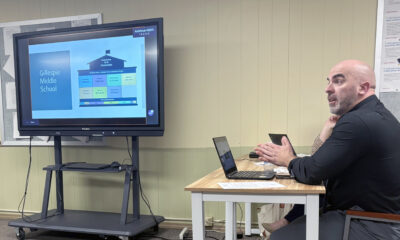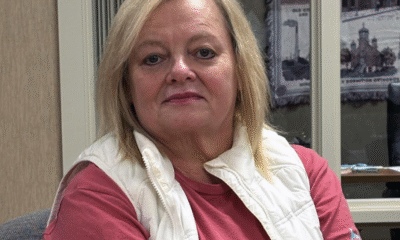
Treasurer Dan Fisher (right) addresses the council.
The treasurer for the City of Gillespie had a lot to say about how city officials handle their subcommittees and how city funds are spent during the city’s committee meeting held Monday evening, July 27.
Dan Fisher, the elected treasurer for Gillespie, spoke to the council for over 30 minutes about how bills are paid and more importantly, how purchases are appropriated for and planned. During the city’s board meeting held earlier this month, Fisher suggested the council move their meeting dates to coincide with how the bills are paid.
He explained that many council members bring up issues or have questions about certain bills during the council meetings, but the questions are left to be answered by the city clerk who isn’t present at the board meetings. In addition to dragging out the meetings, Fisher said the questions should be taken care of before the meeting is held.
“We need to have a standardized process on how we buy things,” Fisher told the council Monday evening. “We need to spend more time on appropriating.”
[pullquote]We need to have a standardized process on how we buy things[/pullquote]Fisher distributed a “Budget Basics” packet to board members during the committee meeting held Monday and said the council should consider implementing a purchase order system to account for all purchases. “That way when the bills come in, we can match the form up with it and everyone knows what the purchase was for and what account it comes out of,” he clarified.
Council members agreed with what Fisher had to say to them. “We need to spend a lot of time when do our appropriation and it’s going to take a lot of time from everyone, including myself,” he continued. “We need to find a way to be collective in how we do things.”
Fisher closed by adding that the council also takes too long at their regular city council meetings, which are held on the second Monday of each month. Speaking of the city’s July meeting that lasted nearly 3 hours, Fisher said the council needs to be much more “business-like”.
“We take too long at our meetings,” he closed. “It’s been proven that people lose focus after 90 minutes and there is no reason why we shouldn’t be able to get a meeting done in 1 hour and 15 minutes.”
City clerk Frances Smith spoke up after Fisher referred to the council’s last meeting. She prefaced her statement by saying she didn’t intend to saying anything, but continued by saying that the council’s July 13th meeting took her three days to transcribe. “It makes the clerk’s job hard – whoever it is,” she said. “There is a lot of side conversations and it’s very hard to hear on the tape.”
Ash Street Project
Alderman Steve Kluthe informed the board that he received the bid specifications back for the Ash Street Project which allows the council to advertise the specs to get an idea how much drainage project will cost.
Kluthe said the bid specifications cover everything including equal opportunity employer and prevailing wage information, but said the project could probably be handled by a local contractor. The project includes installing a culvert that will transfer the water to Cherry Street.
The council hopes the completed project will then alleviate the water that currently gets backed up north of Ash Street. “They are going to put a culvert underneath Ash Street to the north and grade the ground on the north side so the water flows to the culvert and down to the south end where there is a storm drain,” Kluthe explained.
TIF District
[pullquote]We should stretch the money out and begin to reinvest the money into community development[/pullquote]Fisher informed the council that the tax bills for the TIF district went out and the city can expect to receive close to $60,000. He reminded the council that even though the city made a big payment to United Community Bank last year in excess of $90,000, there will still be a payment made to UCB for their portion paid into the TIF until the TIF expires, which Fisher said is 12-14 more years.
After the city pays UCB, Fisher said the council can expect to still have somewhere north of $40,000 remaining each year. “I would like us to start to look at other projects that meet the TIF criteria that we could spend $20-$30,000 per year,” Fisher explained. “Long-range projects – projects that could last 10-12 years. We should stretch the money out and begin to reinvest the money into community development.”
– – – – – – – – – – – – – –
There are plenty of ways to keep up on BenGil news:
Sign up for our weekly email newsletter
Follow us on Twitter for the fastest breaking news updates and score updates
Like us on Facebook for a slightly different take
Share this story
Comments
comments
























